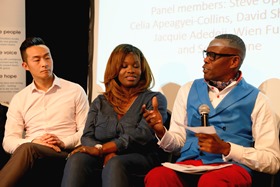Generous faith: Giving to charity a priority for millennial Christians
Christians aged between 18 and 37 are "extremely generous" and giving to charity is a top priority for them, a new survey shows.
Nearly half of millennial Christians, the cohort that came after Generation X, give away at least a tenth of their money, in accordance with the Biblical command to "tithe". Black and minority ethnic Christians are the most generous, with six in ten giving away a tenth of their income compared to just over four in ten of white British young adults.

According to Building tomorrow's Church today: the views and experiences of young adults in the UK Church, published by the Evangelical Alliance, three-quarters of millennial Christians say faith is the most important factor in the decisions they make. Worryingly, one in four said older people in their church struggle to relate with them and a fifth were thinking about leaving.
White Christians were more liberal and black and minority ethnic Christians more conservative on issues such as the authority of the Bible, evolution, homosexuality, cohabiting and marrying a non-Christian. More than seven in ten BME millennials believe the Bible is without error compared to 52 per cent of white British young adult Christians.
The survey found that three in ten have frequent or continual doubt, although their faith is strong enough to cope.
Bible-reading is less popular than prayer. Around 63 per cent of young adults pray daily, while just a quarter read their Bibles every day.
Steve Clifford, general director of the Evangelical Alliance, said: "Our research proves that not all young adults are leaving the Church in droves. They are passionate about prayer, sharing their faith and giving. However there is still work to be done." He said it was worrying that the survey showed millennials lack suitable mentors.
"Mentoring is the most effective tool we have in undoing past mistakes the Church has made and transferring wisdom gained over a lifetime. It is a privilege. Within each Christian leader is the potential for limitless reproduction. We can do this."
The report states that less than half, (49 per cent), said that the teaching they find most benefits them is teaching from their church – meaning leaders cannot assume that it is their preaching that most influences millennials in their congregations. It illustrates that other channels such as podcasts, online blogs and social media benefit them in their pursuit towards a closer relationship with God.
Yemi Adedeji, director of the One People Commission of the Evangelical Alliance, said: "Peer pressure is a huge reality for Christian millennials who can sometimes feel compelled to behave a certain way in order to fit in to student or work life. As church leaders we have a mandate to use the results of this survey to examine how we are engaging with young people and to consider how we can listen to the next generation and position them for success in every area of their lives."
The young adults surveyed were committed church attenders, with 89 per cent attending church weekly, and with another 10 per cent attending at least monthly.
Ben Doggett from Jubilee Church, Maidstone, reflected at the launch event on how young adults hate taboos, meaning that when churches sweep issues under the carpet, they can often more harm than good.











